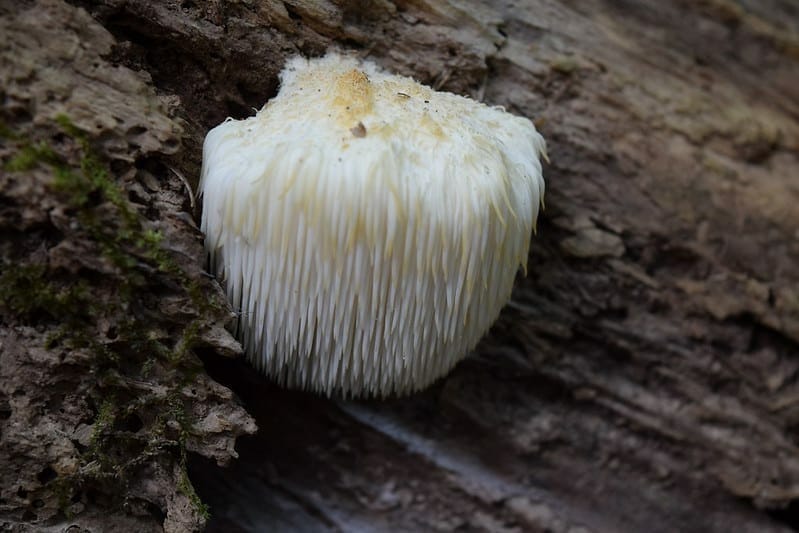Echinacea (Lion’s mane) is a mushroom that is being talked about more and more in the context of its broad bioactive properties and elimination of health deficiencies commonly observed today, such as weak immunity or reduced mental performance. In these fields the Lion’s mane mushroom performs surprisingly well. It naturally mobilizes our body to effectively fight pathogens and free radicals and regenerates the nervous system, which translates into better brain function. However, there are many more valuable properties of coneflower and it is undoubtedly worth taking a closer look at them. It is certainly one of the most valuable natural resources endowed with health promoting properties.
Table of contents
- 1 Echinacea – a peculiar medicinal mushroom with a rich, centuries-old tradition in Asian countries
- 2 Echinacea – composition. What active substances are responsible for the unusual properties of lion’s mane?
- 3 Echinacea – health promoting properties, effects on well-being
- 3.1 Echinacea improves immunity and supports the fight against pathogens
- 3.2 Echinacea regenerates and protects the nervous system and prevents neurodegenerative diseases
- 3.3 Sophora coneflower improves mental health, helps with depression, relieves stress
- 3.4 Echinacea for a healthy cardiovascular system
- 3.5 Echinacea supports the digestive system, protects the liver
- 3.6 Echinacea helps stabilize blood sugar levels
Echinacea – a peculiar medicinal mushroom with a rich, centuries-old tradition in Asian countries
Echinacea(Hericium erinaceus) is one of the most highly regarded medicinal mushrooms, noted for its highly beneficial effects on the nervous system and a number of other positive properties. It is known by many names, for example: Lion’s mane, Yamabushitake, Houtou, Lion’s mane, Old man’s beard. These terms are closely related to the characteristic appearance of Hericium erinaceus – the fruiting body of the mushroom resembles a bright, long, downy, magnificent mane or beard.
Echinacea is very popular in Asia (e.g. Japan, China, Korea, India), where it has long been used both for food (it is a valued edible mushroom) and medicinal purposes. It has been present in traditional Chinese and Japanese medicine for many centuries – it has been used, among others, to fight liver, kidney, stomach and heart diseases, as well as for weakening the body and to improve the condition of the nerves and mind.
In the wild, the Lion’s mane fungus is rare (it is protected), the most common is in old deciduous forests, and it can appear both on dead wood and on live trunks, especially of older trees (especially on beech and oak trees, sometimes on apple and walnut trees). In the wild, coneflower grows in the northern hemisphere in Asia, Europe, America. For industrial purposes (food and pharmaceuticals) it is grown in Asia, especially in China and Japan.
Echinacea – composition. What active substances are responsible for the unusual properties of lion’s mane?
A rich arsenal of vitamins and minerals enriched with several valuable bioactive compounds – this is the composition of Echinacea. The mushroom also contains large amounts of protein, which is why, as a substitute for meat, it is often an important part of a vegetarian’s diet.
A list of the most important components present in the Lion’s mane mushroom:
- Zinc,
- selenium,
- potassium,
- iron,
- sodium,
- phosphorus,
- germanium,
- B vitamins,
- vitamin D,
- essential amino acids,
- polypeptides,
- polysaccharides,
- terpenes,
- sterols,
- hericenones,
- erinacins.
Hericenonesand erinacins are the most important substances of Echinacea, thanks to which the fungus, among other things, has a restorative effect on the nervous system by stimulating nerve growth and influencing neuron elongation and the formation of myelin sheaths. These properties translate into a significant improvement in brain function and reduction of many ailments such as dementia, memory problems , and cognitive decline. For these reasons, Lion’s mane mushroom may be helpful in inhibiting the progression of Parkinson’s and Alzheimera diseases, among others.
Echinacea – health promoting properties, effects on well-being
Hericenones and erinacins, as well as other active components included inEchinacea, improve the work of many organs and systems, as well as improve hormonal and metabolic processes occurring in our body, thus contributing to an increase in the condition of the body.
How exactly can Lion’s mane improve our health? Let’s learn about the most important properties of this remarkable mushroom.
Echinacea improves immunity and supports the fight against pathogens
One of the main advantages of Echinacea is stimulating the immune system and thus increasing the defense barrier of our body against any adverse effects. Lion’s mane favourably influences work of intestinal bacteria, which are co-responsible for good condition of the immune system. Moreover, it stimulates production of interferon and leads to increased activity of macrophages and lymphocytes, i.e. immune cells responsible for capturing and fighting pathogens, such as viruses and bacteria.
Echinacea can therefore be a natural remedy for people struggling with weak immunity and susceptible to various infections, diseases and colds. Thanks to Echinacea, the risk of invasion and spread of harmful microorganisms in the body is reduced, and if an infection does occur, the fungus helps to deal with it easier and faster. In addition to anti-inflammatory, antibacterial, antiviral properties, Lion’s mane exhibits anti-cancer properties.
Echinacea regenerates and protects the nervous system and prevents neurodegenerative diseases
It used to be a common belief that neurons slowly disappear over the course of a person’s lifetime, that the production of new nerve cells in an adult and the regeneration of damaged ones was impossible, but Lion’s mane is one piece of evidence that it is possible. This amazing fungus stimulates the production of nerve growth factor (Nerve Growth Factor – NGF), and thus stimulates neurogenesis, which is the process by which new neurons are created and provided with proper connections.
As a result of the production of new neurons and new connections in the nervous tissue, brain plasticity increases, memory and concentration improve, thought processes improve and general intellectual performance improves.
The nootropic properties of coneflower go hand in hand with protective properties of the nervous system. Lion’s mane protects nerve cells from destruction and atrophy, prevents neurosis, neurodegenerative disorders such as Parkinson and Alzheimer, and counteracts cognitive decline in advanced age.
Also learn about an amazing herb with nootropic and adaptogenic properties: Gotu cola
Sophora coneflower improves mental health, helps with depression, relieves stress
Lion’s mane positively influences mental form, allows to get rid of minor nervous disorders, as well as relieve symptoms of more serious ones. It shows antidepressive properties, eliminates anxiety, suppresses feelings of restlessness, soothes nerves, fights nervousness and tension, reduces sleep disorders.
Echinacea can also be a valuable support for people who often find themselves in stressful situations. It improves one’s ability to keep one’s distance from problems and unfavorable external factors, improves general well-being, increases relaxation, stabilizes mood, and reduces susceptibility to stress.
Check out the top dietary supplement for effective stress reduction and improved brain function: Brain Actives

Echinacea for a healthy cardiovascular system
A diet high in saturated fats, an inactive lifestyle, and excessive use of stimulants are all factors that contribute to increased levels of bad cholesterol, a weakened heart, and the development of cardiovascular diseases such as hypertension, coronary artery disease, atherosclerosis, etc.
In order to reduce the risk of these dangerous ailments, the first step should of course be a change in diet and lifestyle to a healthier one, although it is also worth helping ourselves through the use of natural blood system boosters, such as the discussed Echinacea.
It helps regulate blood pressure, reduces triglyceride levels, maintains normal cholesterol levels (lowering bad cholesterol LDL and raising good cholesterol HDL), reduces the risk of atherosclerosis, and inhibits the process of platelet aggregation which is very dangerous as it contributes to the formation of blood clots.
Read our review of this new cardiovascular health booster: Cardio NRJ
Echinacea supports the digestive system, protects the liver
Many people today complain of various chronic ailments related to improper functioning of the digestive tract, which is often related to an unhealthy diet full of processed foods and psychological factors (e.g. high levels of stress and nervous tension cause stomach disorders).
Lion’s mane can be a good remedy here. It stabilizes digestive processes and the work of organs comprising the digestive system, protects the liver, spleen, stomach and intestines. It fights stomach aches, heartburn and indigestion and prevents stomach ulcers.
Echinacea helps stabilize blood sugar levels
Diabetes, as well as the insulin resistance that precedes it, are some of the most common health ailments of our time. More and more people are struggling with glycemic disorders, which is a direct result of poor diet. A diet dominated by products with a high glycemic index leads to a dysregulation of carbohydrate metabolism and the constant occurrence of rapid fluctuations in blood glucose levels, which unfortunately often results in diabetes.
Changing the way you eat and using natural blood sugar regulators, such as coneflower, are effective ways to normalize sugar metabolism in the body and avoid or inhibit the development of diabetes.
Read also: Diabetic diet

